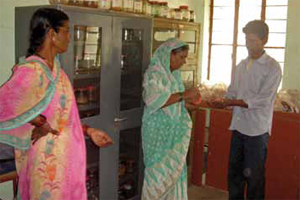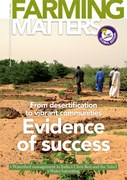Farmers’ knowledge and experience has not been adequately translated into policies and strategies by governments, the private sector or civil society organisations. In general, not enough is known about these transformation processes. Is there a glass ceiling that limits the spread of good agrobiodiversity practices? The agrobiodiversity@knowledged programme, started by Oxfam Novib and Hivos, aims to collect and disseminate ideas from all over the world to add insights and evidence to current debates and to strengthen good practices worldwide.
India’s small-scale farmers, most of whom farm less than 2 hectares of land, play a central role in feeding the country’s population of more than one billion people. Yet, these are hard times, and many men migrate away from the countryside.
As a result, women are becoming increasingly involved in farming. They are also often guardians of local knowledge, which increases the importance of their role. One of these many women is Shakuntalabai Sukhdeo Mule, a champion of organic farming and biodiversity conservation. She lives in the village of Shekta, in the state of Maharashtra, a very dry part of India.
Her very simple demeanour belies her deep knowledge about farming and the region’s biodiversity. She has spent the past twenty years of her life talking about organic farming and biodiversity, and she “walks this talk” – doing at a village level what the Agrobiodiversity@knowledged programme aims to achieve at a global level.
Farmer and organiser
Shekta, in the state of Maharashtra
“At the age of thirteen, I was married off to a man of 45. At fourteen, I had a son. By fifteen, I was a widow. My in-laws bullied and exploited me, then kicked me out and kept my son. A rich man adopted me. In the daytime I worked on his land. He gave me a small salary. I also did nightshifts to earn money to give my son a better education, later on in life. Then, one day, a farmers’ organisation came to my village and asked if I was interested in organic agriculture. I said I was. In 1992, I started as a volunteer, and now I take care of eight farmers’ groups. My own organic farm is about five acres. I grow millet, sorghum, chickpea, and cotton. I have two bulls, one cow and a cart. I bring other farmers to my fields to show them what organic agriculture is.
“Creating a farmers’ groups starts with identifying people who are interested and who have a lot of biodiversity. In my village alone, some fifty farmers showed up to the first meeting. I selected twenty of them to start developing a joint enterprise. The members contribute 100 rupees per month. A committee of five members takes care of environmental issues, seeds, financial management and information. They keep note of every aspect, from input to output, from irrigation and compost to the amount of workers and the revolving funds. We also run an organic shop, and every Friday we have an organic bazaar in two cities to sell our certified products, and to raise awareness among consumers. Farmers sell directly to the customers, mainly lower and middle class people. We do not deal with middlemen, so the income of the farmers is even higher.
“Being a development animator, I have access to a lot of knowledge on health and agriculture. My biggest reward is social status and knowledge; not money.” (Karoline Bias)
Shakuntalabai, as she is widely known, become a member of a local women’s group, or mahila mandal, in the early 1990s, and because of the interest and enthusiasm she showed, she was soon asked to be the leader. IIRD, the Institute for Integrated Rural Development, invited her to participate in a series of training courses in organic farming.
Recognising the difficulties farmers were going through, and the clear benefits of organic farming, she shared the knowledge she gained among the women in her village, encouraging them to take up organic methods.
Gradually, the number of farmers involved increased, and she began to help establish farmers’ groups in the neighbouring villages. These groups have been developing rural enterprises, drawing on members’ savings for financial resources and technical support from development organisations.
As the number of organic farmers increased, they became interested in developing a system that would help farmers to certify their products as organic, without relying on (often expensive) external institutions. Following what is now known as a Participatory Guarantee System (PGS), farmers share information about inputs, processes and yields, and all of them are regularly involved in documenting and assessing this information.
Certification improved their commercial opportunities and encouraged them to set up the Mahagreen Producer Company (in March 2011). This farmers’ co-operative already has 1,100 members. The company is run by a board of 9 Directors, all women farmers, with Shakuntalabai acting as the Secretary.
In just a year, Mahagreen has grown significantly and now sells its (certified) products in the local market, as well as at markets in Hyderabad, Pune, Mumbai, Bangalore, and many other places in south and central India.
Seed banks
The rains, which most farmers depend on, are scarce in Shekta and the Marathwada region, and they have been lower than normal this year. Under these difficult conditions, the best option is to consider growing crops that are drought resistant and provide nutritive fodder for the livestock.
Millets, which require less water, are widely cultivated by local farmers. However, knowledge of the traditional varieties of millets (and other crops) that are well adapted to these dry areas is declining and they are less frequently grown than before, largely because of the promotion of hybrid seeds by seed companies and government extension programmes.
Led by Shakuntalabai, the discussions in Shekta led to the establishment of a community seed bank, where many farmers now exchange traditional seeds. At the moment, the seed bank contains about 200 varieties of seeds, including traditional vegetables such as cluster beans, chillies and brinjals (aubergine).
The bank has helped many farmers grow these varieties of crops again, increasing the amount of food that is locally available. Villagers were quick to notice that, while cash crops have been adversely affected by the droughtlike conditions of 2012, the millets and the traditional crops withstood the testing conditions.
Shakuntalabai and her colleagues are going against the norms of corporate agriculture, which promotes the use of agrochemicals and hybrid seeds. This involves facing many challenges. She remains undaunted and continues to do what she knows best – talking and walking the organic way. Together with the whole community, she has been able to turn the desirable into the attainable.
Joy Daniel
Joy Daniel is the Executive Director of IIRD, a non-profit civil society organisation that was established in 1987 to empower small-scale and marginal farmers, particularly in the Marathwada region of central India. IIRD is part of the Agrobiodiversity@knowledge programme.
E-mail: jdaniel@iird.org.in


